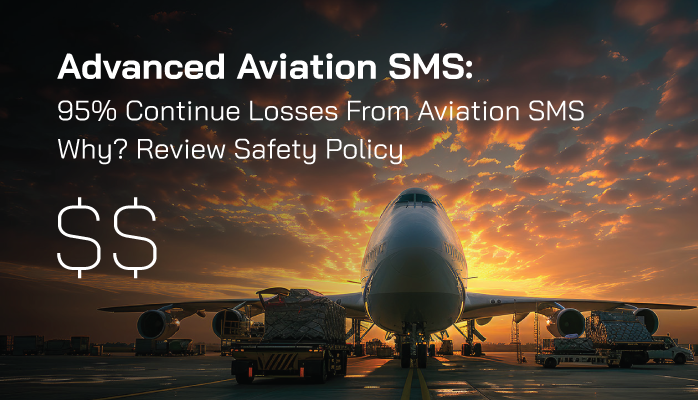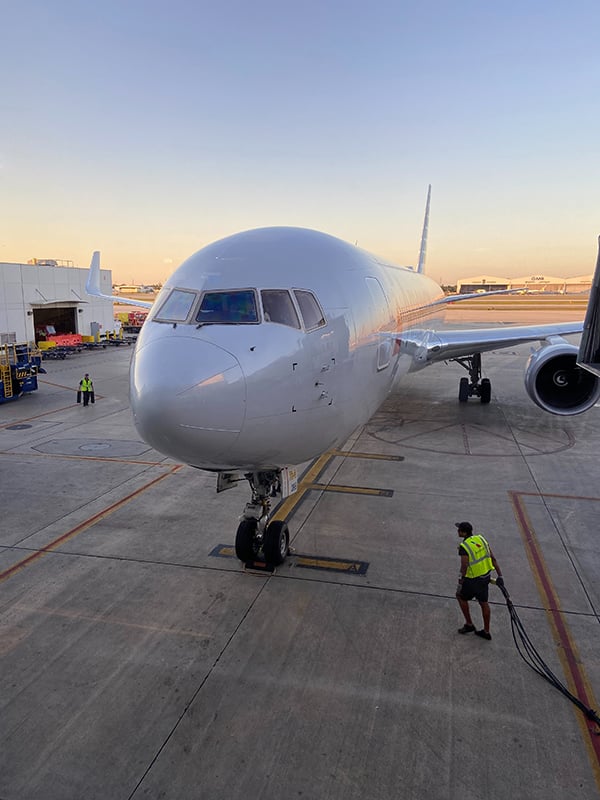Benefits Not Realized From Aviation SMS Implementations

When the drafting founders of modern aviation safety management systems (SMS) planned to improve systemic aviation safety, these managers understood their industry's predominant attitudes relating to safety vs production. They recognized uncontrolled, ill-disciplined operators unnecessarily introduce intolerable risk into our transportation system.
Astute leaders understand that voluntary aviation SMS implementation will never be seriously considered by owners and senior managers unless operators enjoy a chance to financially benefit.
Consequently, several governments and quasi-governmental research projects across the world developed compelling cost-benefit analyses to highlight:
- Societal costs should no action be implemented to improve systemic aerospace safety;
- Aggregate costs of proposed system-wide SMS implementation;
- Average costs per operator implementing formal aviation SMS; and
- Expected value of both tangible and intangible benefits resulting from SMS implementation.
The results obviously favored enhanced safety initiatives realizing both financial and societal benefits. Hence the birth of aviation SMS in November 2006. If you are interested in reviewing one of these cost-benefit analyses, consider the publicly available documentation from FAA's SMS rulemaking activities, such as 14 CFR Part 5. As a quick example, you will see Part 5, Summary of the Costs and Benefits of the Final Rule.
Related Aviation SMS Implementation Articles
- Advanced Aviation SMS: Generating Profits - First Steps
- Why Should We Implement Aviation SMS?
- Your Top 4 Risks to Aviation Safety Management System Implementations
Where Are Promised Aviation SMS Benefits?
From my global, expert vantage point, I see most operators not benefitting financially from their SMS implementations. This failure to recover SMS investments significantly handicaps smaller, marginally profitable operators that have been expending precious financial resources on this safety initiative for over a decade.
Why are they failing? One reason is that they use the wrong safety policy.
"What?" you ask perplexed.
Let's explore.
Financial Benefits Not Sought by Everyone

This Advanced Aviation SMS series attempts to remediate poorly implemented aviation SMS. We also provide expert, justifiable solutions to modify a struggling aviation SMS to become profitable.
We expect most operators will capture financial benefits promised by regulatory agencies when they implement these plausible, heretofore untaught concepts.
The regulator's responsibilities do not include teaching the industry how to profit from legislative mandates. Consequently, don't lose perspective if your auditor looks amused when you announce you are implementing a regulatory-compliant aviation SMS that also aligns with your organizational business goal of "earning a profit."
Almost every SMS implementation has the latent potential to concurrently generate profits while simultaneously satisfying regulatory SMS requirements. However, we should not start envisioning large cash piles snuggled in the cargo hold. Not every aviation SMS is created to generate returns. These are called either:
- Check-the-Box SMS; or
- Paper SMS.
There are many logical scenarios where a "paper SMS" satisfies business requirements. Money is not always a consideration, as managers may be focused on other business considerations, such as:
- Selling the aviation asset in the near future;
- Satisfying government mandates (airports and quasi-military);
- Startup operations with ill-defined, constantly shifting markets and processes;
- Active or expected expansion or reduction in service offerings;
- Poor regulatory oversight minimizing chances to suffer significant penalties; or
- Company lacks qualified resources to properly implement SMS.
This list is not exhaustive, as I've encountered other occasions where a "paper SMS" made perfect business sense.
Related Aviation SMS Implementation Articles
- How to Choose Aviation SMS Software - Educating SMS Professionals
- Spreadsheets vs Software for Aviation Safety Management
- 20 Benefits of Aviation SMS Software
Throwing Away Money From Half-Hearted Aviation SMS Efforts
The majority of operators cannot afford to ignore easy-to-capture-profits. In fact, I'm aghast at how much money operators are willing to throw away.
Each year, operators continue to pay to practice safety, but they don't focus explicitly on unearthing "opportunities." Instead, they focus on "threats" and "hazards." This is the safety mindset! This safety focus handicaps organizations from seeking opportunities from obligatory processes that perpetually drain financial resources.
"Safety" is what regulators tell operators to focus on, so like good sheep, operators obey the tight-lipped master holding threats of revoked operating certificates. Safety managers are reluctant or possibly unqualified to modify "approved SMS processes" to incorporate processes contributing to organizational financial success.
"Why are they ignoring these profits?" I keep asking myself.
There can be only one reason. Operators don't know how to configure their SMS implementations efficiently:
- identify hidden opportunities;
- evaluate these opportunities' financial potential;
- effect cultural changes to deliver opportunities; and
- make money from executing these opportunities without "recreating the wheel" each time.
Since I'm an expert in many related areas, the money is visible, sitting on the street, waiting for you all to pick it up.
Safety Managers must position SMS processes to capture economic opportunities.
Why Listen to Me?
This blog article may be considered financial advice. Why should you listen to me?
You may incorrectly believe that I'm writing this blog for some financial benefit. I am a rags-to-riches story. I now work solely to improve aerospace safety, not to make more money to toss under the mattress.
I know businesses won't embrace SMS as it was designed until they start earning financial benefits. History continues to demonstrate that safety managers don't know how to realize those financial benefits, hence this Advanced Aviation SMS series.
My broad formal education and skills encompass:
- Business management;
- Software programming business Web applications;
- History;
- Psychology and Organizational Behavior; and
- Aviation safety management systems (14 years).
I am a business owner formally trained in business and expert systems. Besides multiple enterprise-level expert systems, I've written much of the code in one of the most popular aviation SMS databases, SMS Pro. I manage the business logic and architecture of this very robust aviation SMS database product.
Related Aviation SMS Database Articles
- 7 Signs You Need an Aviation Safety Management (SMS) Database
- How Long to Switch to New Aviation SMS Database?
- 5 Most Important Things to Know Before Buying Aviation SMS Database
Advanced Education Affords Outside-the-Box Opportunities
My career background, as I approach sixty years of age, has been in
- aviation SMS,
- databases,
- Web application development,
- business, and
- organizational psychology.
I know how to make money using automated aviation SMS processes supported by relational database tools. I'm an American. This last statement is meant to illustrate I've been brainwashed since childhood that:
- More money is always desirable;
- Americans are blessed with ingenuity to solve problems due to lack of resources and economic climate;
- From adversity comes opportunity; and
- Solving solutions using technology improves productivity.
From 1860-1913, the United States had become the most productive industrial nation in the world. We still maintain an evident culture of inventiveness and entrepreneurialism. Consequently, I'm a product of my environment and age.
Perhaps the most important reason you should listen to me is that: "I'm right." I may be a bit long-winded in this Advanced Aviation SMS series, but my message will be supported by logic.
Origin of Wrong Safety Policy

The reason 95% of aviation SMS implementations do not make money is because they have been psychologically handicapped to focus predominantly on safety.
Imagine a pilot assigned to implement a regulatory-compliant aviation SMS. Naturally, this pilot would research the assignment to learn SMS requirements. His research would lead him to guidance materials illustrated and promoted by:
- ICAO;
- Regional regulatory authorities (FAA, EASA, Transport Canada, DGCA, CASA, etc.);
- SMS consultants (many boasting dubious credentials); and
- College textbooks.
Important Point: All of these educational resources were created to demonstrate aviation SMS concepts, not to demonstrate how to make money while implementing your aviation SMS. Conversely, if this same pilot were assigned to deliver a money-making aviation SMS implementation, the original mindset would shift to encompass the additional requirements of:
- Not only delivering a regulatory-compliant aviation SMS but also to
- Use this opportunity to generate opportunities and additional revenues from the implicit quality management elements embedded within each aviation SMS.
95% of SMS implementations are handicapped to focus on safety!
Focused Efforts Lead to Missed Opportunities
I'm assuming that if you are reading this article,
- you manage an active aviation SMS;
- your SMS is not making money (if you have one);
- the accountable executive has provided permission to change your SMS implementation strategy; or
- you are the accountable executive reading this to determine whether I'm a snake oil salesman.
From the logic posited above, if you focus only on safety, you will only get safety results. If you focus on safety and revenue, then you will get a different result.
When humans have a recipe, we follow the recipe and focus on achieving the "glorious objective." Business managers are task-focused. For this discussion, "regulatory compliance" is the most common objective for SMS implementations.
Our minds have been trained to reject distractions that prevent us from reaching our goal in a timely, expeditious manner. In this case, our assigned safety manager's objective is to deliver a regulatory-compliant SMS without disrupting income-generating operations as much as possible.
Management teams charged with implementing aviation SMS are tasked to "implement aviation SMS," not to search for new ways to make money from this apparent "adverse business challenge." Consequently, the original mindset possesses imperfect information and an unrealistic vision of what a performant SMS should look like.
If you focus only on safety, you will only get safety.
Policy Promotes Quality Boosting Safety
To change the focus of an aviation SMS implementation, we must start at the top. In earlier posts, I recommend that you first acquire top management support for amplifying your SMS scope from a strict "safety focus" to an integrated safety and quality approach.
"Safety through quality" is a noble and worthy ideal that will resist a challenge from any SMS regulatory auditor.
An SMS auditor can tell you what is required, but typically cannot dictate how audit requirements must be procedurally satisfied. Any detailed "step-by-step, one-size-fits-all" approach is not feasible due to the vast number and assortment of aviation service providers, ranging from airlines, and airports to flight schools, and more. Every operator is encouraged to have a "right-sized" SMS that aligns with the organization's
- size;
- complexity; and
- business goals.
"Safety through quality" logically reduces risk to as low as reasonably practical (ALARP) as employees seek ways to perpetually improve operations. As the number of safety and quality reports increases, processes are improved, thereby improving safety and operational quality.
To effect this change, we must consult the accountable executive, which we stressed repeatedly in the previous articles in this Advanced Aviation SMS series.
The accountable executive must be educated as to the missed, potential opportunities. This step is critical, as the aviation SMS' goals are always subordinate and must align with corporate goals and objectives.
Accountable executives remain responsible and accountable for the implementation and ongoing maintenance of the perpetual, budget-consuming aviation SMS. Consequently, the accountable executive must explicitly communicate the desire to mine and execute business opportunities from within your approved aviation SMS.
Why Start at Safety Policy for Profit-Centered Approach?

For seasoned aviation SMS practitioners, we know that an aviation SMS "is a formal, top-down, organization-wide approach to managing safety risk."
"Top-down," means that the accountable executive is responsible for the aviation SMS. Accountable executives control safety initiatives through policy and visible commitment, which is seen by:
- regular safety performance monitoring;
- attendance at safety meetings;
- newsletters and safety communications; and
- financial support.
Safety policy is a set of rules or guidelines communicated to stakeholders demonstrating how the organization achieves specific safety goals.
Safety Policy Is Visibly Endorsed and Championed by Accountable Executives!
Effective safety policies communicate:
- Expectations;
- Desirable and undesirable behaviors;
- Procedures;
- Principles; and
- Decision-making guidance.
The accountable executive is already familiar with the safety policy. He has signed the safety policy at least once in the past, assuming you have an active aviation SMS implementation.
Quick question: Did your accountable executive write the safety policy? Or did the safety manager provide a template?
Based on the answer, the next step will be to integrate the verbiage and principles of a quality management system into your safety management system. Your SMS will then be primed to focus on the opportunity as well as address safety risks while complying with SMS regulatory requirements.
Related Articles on Integrated SMS and QMS
- QMS Programs vs Aviation Safety Management Systems (SMS)
- 4 Considerations About QMS and SMS in Aviation Safety Management
- How Integrating QMS and SMS Will Improve Aviation Safety Audit Performance
What's Included in Integrated Safety and Quality Policy?
I repeat that I may become long-winded in this Advanced Aviation SMS series. I'm trying to paint a complete picture based on my limited abilities to communicate via words.
We've explored so far that the majority of aviation SMS implementations fail to generate positive financial returns. There are likely multiple root causes for every operator, including:
- safety-focused mindset during implementation;
- imperfect, limiting instructions commanding the SMS implementation team;
- audited SMS documentation requirements requiring troublesome approvals; and
- the freshness of aviation SMS in the industry; thereby hindering creativity in implementation.
The safety policy is the correct tool to begin remediating harm already visited upon your aviation SMS. The safety policy will communicate accountable executives' desire to focus not solely on safety, but to focus on "safety through quality."
Regulatory SMS requirements are regularly inspected by regulatory auditors. A "safety policy" is a regulatory SMS requirement. Significant changes to SMS implementations may require regulatory approvals. What can be construed as "significant" will be defined by individual auditors. One must remain tactful when dealing with SMS auditors. Some battles are not worth fighting.
One tactful way to avoid undue auditor scrutiny in your modified SMS approach is to use terminology that excites SMS regulatory agencies and auditors. Tell them that your SMS is maturing and shifting focus toward "continuous improvement." Continuous improvement is an expectation of every mature SMS implementation as they reach Phase 4.
Continuous Safety Improvement Achieved Through Quality!
What would I do to keep things simple?
In my SMS, I would rename my "Safety Policy" to "Safety and Quality Policy." Then I would rewrite the policy to motivate employees and managers to seek and report opportunities as well as threats.
Final Thoughts on Safety Policy Limitations
Focus on safety, and you will only get safety.
Accountable executives must permit to change the focused organizational safety culture to one that seeks to improve safety by constantly improving the service quality.
What words will motivate employees to focus on quality to enrich the business? Carefully considered words, to be sure.
I did not intend to provide a template for a safety and quality policy. There are many already online. I would look for inspiration at one of the Fortune 500 companies.
Finally, if I were to focus on generating profits from my SMS implementation, I would:
- Recognize that SMS workflows are equally applicable for other initiatives besides safety;
- Earn top management support to seek financial opportunities from the SMS;
- Embrace science and technology to increase chances for sustainable success; and
- Revise the safety policy to include sincere, continuous improvements to quality and safety.
Sustainable Automated Processes Increase Financial Opportunities
When processes are not easy, they are not followed for long.
Automation decreases the level of effort to accomplish repeatable tasks.
A wise manager seeks an aviation SMS database purposefully built to:
- address SMS requirements; while also being able to
- identify, evaluate, and store future opportunities.
SMS Pro will satisfy the "wise manager," but is too much for a "check-the-box SMS." If you need a sustainable database to recharge your aviation SMS, I recommend SMS Pro.
Last updated in March 2025.







